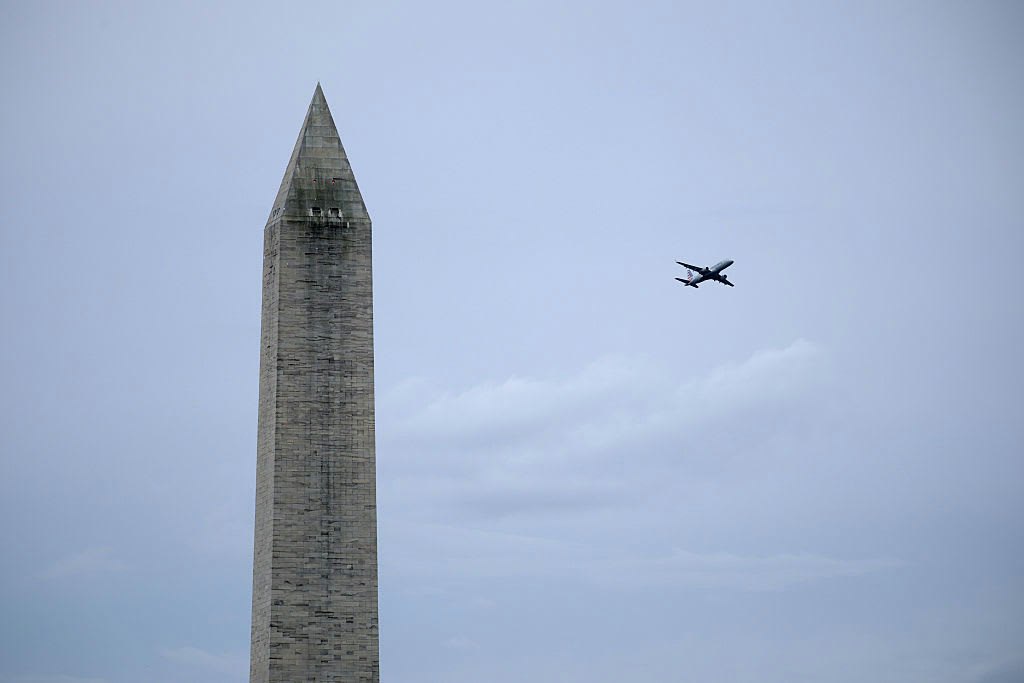Federal workers to miss 2nd paycheck if government doesn't reopen by midnight
Around 800,000 federal employees are affected by the ongoing government shutdown. And some 380,000 of those employees are furloughed without pay, while the remainder are working without pay. Many on furlough have been recalled to work, so that Americans can have their tax refunds processed and food and drugs inspected, among other tasks.
If a deal to reopen the government is not reached by midnight Tuesday, federal workers will miss their second paycheck since the shutdown began. The president has signed a bill providing back pay for federal employees when the government re-opens. But for the workers who have gone 32 days without pay, the promise of repayment doesn't address their current financial needs.
Federal employees are receiving assistance at pop-up food banks, including mobile pantries which travel to airports to help TSA officers. The TSA said in a press release that there was a 7.5 percent rate of unscheduled absences Monday, up 4 percent from a year ago, with many employees reporting "that they are not able to report to work due to financial limitations."
The 800,000 government workers affected have lost an average of $5,000 each since the shutdown began last month, about $200 million per workday in delayed wages.
Federal workers are not the only Americans negatively affected by the shutdown. The Department of Housing and Urban Development was one of the hardest-hit agencies, with 95 percent of its workforce on furlough due to the shutdown. Several HUD programs intended to support lower-income Americans stopped working on Jan. 1, meaning that many people are unable to pay their rent without the typical assistance from the federal government. Furthermore, several nonprofits which help the homeless and the financially insecure who have been struggling without the typical boost from HUD payments.
The shutdown could also affect the 42 million Americans on food stamps if it extends through the spring. The U.S. Department of Agriculture, which oversees the Supplemental Nutrition Assistance Program (SNAP) at the federal level, is one of the agencies unfunded during the partial government shutdown. USDA Secretary Sonny Perdue announced this month that SNAP would be funded through February, thanks to the funding bill that expired on Dec. 22, which included a provision allowing federal agencies to make obligated payments to support certain programs for 30 days after its expiration date.
In September 2018, the last month for which data is available, $4.7 billion in SNAP benefits were disbursed throughout every state. If the shutdown continues through March, there will be no remaining funding for SNAP, endangering food stamps for millions of Americans. The Women, Infants, and Children (WIC) program, which assists pregnant, postpartum and breastfeeding women, infants, and children up to age 5 who fall within the poverty index and are at "nutritional risk," will also run out of funding by March 1.
The ripple effects of the shutdown continue for contractors reliant on the federal government who are unlikely to receive back pay. Applications for unemployment in early January rose in states with large numbers of federal contractors. In Washington D.C., unemployment claims rose to 2,158 from 1,190. In Virginia they jumped to 5,966 from 3,497, and in Maryland to 4,949 from 4,467. In cities like Washington, businesses and restaurants are hurting because of lower traffic.
The shutdown is also affecting government workers who are divorced and who, because of the lack of a paycheck, are unable to provide child support or alimony payments. Several unions are suing the federal government on behalf of unpaid workers.
The effects of the shutdown are not just felt by individuals, but by the economy, too. Average weekly direct and indirect costs of the partial shutdown, which began Dec. 22, currently add up to $1.2 billion, according to Beth Ann Bovino, S&P Global's U.S. chief economist. Monday marked the start of the shutdown's fifth week, and if the government does not reopen by the end of the week, it's on track to exceed the $5.7 billion President Trump wants for a southern border wall.
And the average weekly cost of the shutdown is expected to grow as the damage to industries and consumers both widens and deepens. "The longer this shutdown drags on, the more collateral damage the economy will suffer," Bovino wrote.
Meanwhile, President Trump and Congress seem no closer to reaching a deal on reopening the government. Mr. Trump offered a deal to Democrats over the weekend extending temporary protections for the Deferred Action Childhood Arrivals (DACA) program and the Temporary Protected Status (TPS) program. While the Senate will vote on the deal this week, Democrats have already expressed opposition due to the temporary nature of the extended protections, and the $5.7 billion border wall funding request.
On Jan. 4, Mr. Trump was asked what he would say to federal workers who may not have a financial safety net if they remain unpaid for an extended period of time. He replied that the "safety net is going to be having a strong border because we're going to be safe."
"This really does have a higher purpose than next week's pay," Mr. Trump said. "And the people that won't get next week's pay or the following week's pay, I think if you ever really looked at those people, I think they'd say, 'Mr. President, keep going. This is far more important.'"
Megan Cerullo, Irina Ivanova and Kris Van Cleave contributed reporting.



